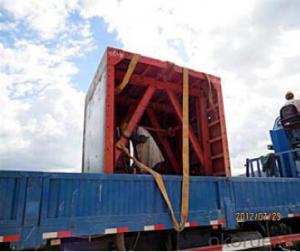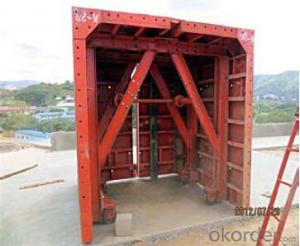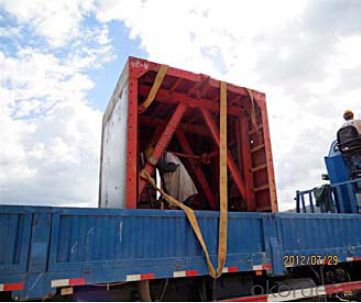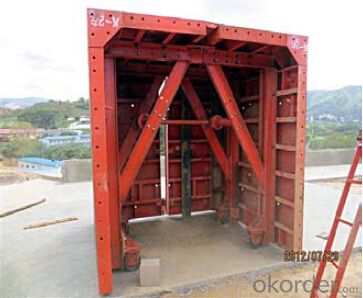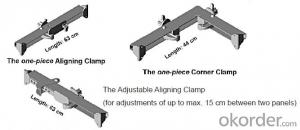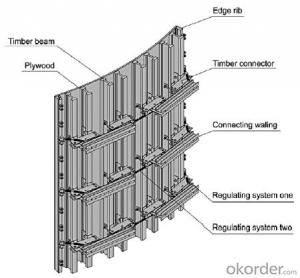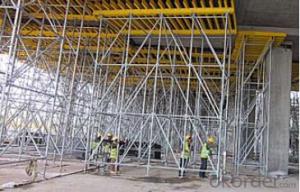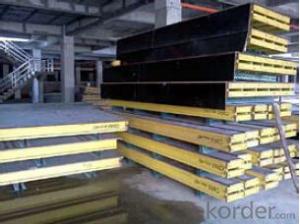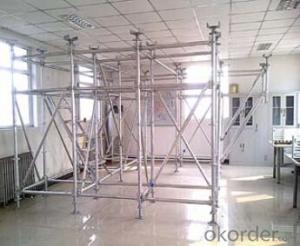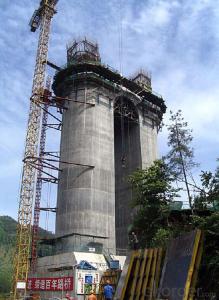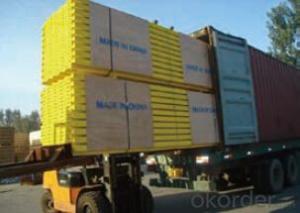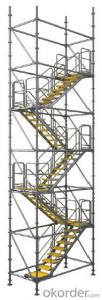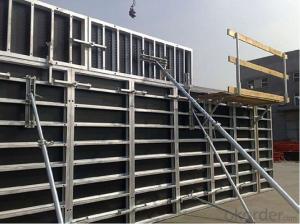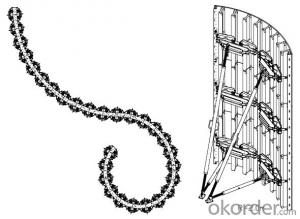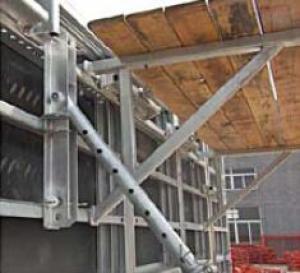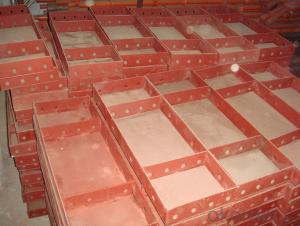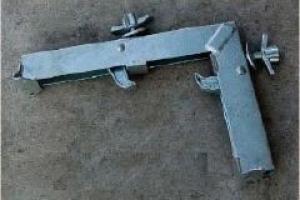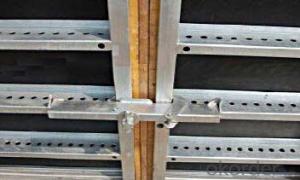Steel tunnel for formwork and scaffolding system
- Loading Port:
- Tianjin
- Payment Terms:
- TT OR LC
- Min Order Qty:
- 50 m²
- Supply Capability:
- 1000 m²/month
OKorder Service Pledge
Quality Product, Order Online Tracking, Timely Delivery
OKorder Financial Service
Credit Rating, Credit Services, Credit Purchasing
You Might Also Like
Building Tunnel Formwork:
A compositional steel formwork system mainly used in the building which has regular structure
without beams, the excellent formwork system can make the integral pouring for the wall & slab
easily achieved.
Characteristics:
◆ High stiffness, make perfect shape for concrete.
◆ Easy operation, save labor and force.
◆ Fast forming, repeatedly turnover.
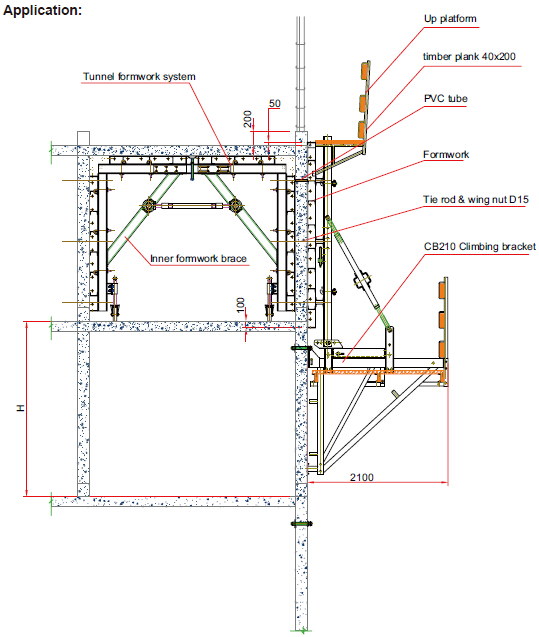
- Q: How does steel formwork handle concrete setting time and curing temperature?
- Due to its exceptional heat transfer properties and durability, steel formwork is highly preferred for managing the concrete setting time and curing temperature. The excellent heat conduction of steel aids in dissipating the heat produced during the hydration process of concrete, thereby expediting its setting time. This enables a quicker construction process and reduces the overall project duration. Moreover, steel formwork possesses the capability to endure elevated curing temperatures without distorting or deteriorating. This becomes particularly crucial in situations where high-temperature curing is necessary to attain the desired strength and durability of the concrete. Steel's resilience against high temperatures guarantees that the formwork remains intact and steady, providing essential support to the concrete throughout the curing process. Additionally, the strength and rigidity of steel formwork prevent any deformation or movement during the concrete setting and curing phases. This plays a vital role in maintaining the desired shape, size, and surface finish of the concrete structure. By employing steel formwork, the concrete remains securely in place and avoids any undesirable shifts or displacements during the curing process. In conclusion, steel formwork is an optimal choice for managing concrete setting time and curing temperature due to its exceptional heat transfer properties, ability to withstand high temperatures, and its strength and rigidity. Its utilization facilitates accelerated setting times, enables high-temperature curing, and guarantees the stability and integrity of the concrete structure during the curing process.
- Q: How does steel formwork accommodate for different concrete curing temperatures?
- Accommodating various concrete curing temperatures is easily achieved with steel formwork, thanks to its versatility and reliability. The standout characteristic of steel formwork is its exceptional thermal conductivity, which effectively dissipates heat from curing concrete. This unique property enables the steel formwork to effectively regulate the concrete's temperature during the curing process. When precise control over the concrete curing temperature is necessary, steel formwork can be equipped with additional features to meet these requirements. For example, insulation materials can be applied to the steel formwork to minimize heat loss or gain, ensuring a consistent and steady curing temperature. This adaptation proves especially beneficial in extreme weather conditions when the ambient temperature can have a significant impact on the curing process. Furthermore, steel formwork can be combined with heating or cooling systems to further regulate the concrete curing temperature. In colder weather conditions, heating elements can be integrated into the steel formwork to maintain an optimal temperature for proper curing. Similarly, in hotter weather conditions, cooling systems can be employed to prevent excessive heat from affecting the curing process. In addition to its temperature control capabilities, steel formwork boasts exceptional strength and durability, making it an ideal choice for accommodating various concrete curing temperatures. The robust nature of steel formwork allows it to withstand the pressure and stresses exerted by the curing concrete, regardless of the temperature. This ensures that the formwork remains intact and stable throughout the curing process, preventing any deformations or failures that could compromise the quality of the concrete structure. Overall, steel formwork offers a comprehensive solution for accommodating different concrete curing temperatures. Its high thermal conductivity, compatibility with insulation materials, and integration with heating or cooling systems make it a versatile option. Additionally, its strength and durability guarantee its ability to withstand the challenges posed by varying curing temperatures, ensuring successful and optimal concrete curing.
- Q: What are the common design considerations for steel formwork in marine environments?
- When designing steel formwork for marine environments, there are several common considerations that need to be taken into account. These considerations are necessary to ensure the durability and longevity of the formwork in the harsh marine environment. Some of the common design considerations for steel formwork in marine environments include: 1. Material Selection: The selection of appropriate materials is crucial for withstanding the corrosive effects of saltwater. Stainless steel or other corrosion-resistant alloys should be used to prevent rusting and deterioration. 2. Coatings and Surface Treatments: Applying protective coatings or surface treatments can further enhance the corrosion resistance of the steel formwork. These coatings may include zinc-rich primers, epoxy coatings, or galvanization to provide an additional layer of protection. 3. Reinforcement and Strengthening: Marine environments can subject the formwork to significant forces such as waves, currents, and impact from floating debris. Reinforcement and strengthening measures, such as additional bracing or thicker steel sections, may be necessary to ensure structural integrity. 4. Drainage and Ventilation: Proper drainage and ventilation are crucial to prevent the accumulation of water, which can accelerate corrosion. Designing the formwork with appropriate drainage channels or weep holes can help remove any trapped moisture. 5. Connection Details: Special attention should be given to the connection details in marine environments. Corrosion-resistant fasteners, such as stainless steel bolts or galvanized screws, should be used to prevent premature failure due to corrosion. 6. Maintenance and Inspection: Regular maintenance and inspection are essential to identify any signs of corrosion or damage. Scheduled cleaning, removal of marine growth, and applying protective coatings as needed will help extend the life of the formwork. 7. Environmental Considerations: The marine environment is often subject to extreme conditions such as high winds, tidal forces, and exposure to UV radiation. The design should consider these factors to ensure the formwork can withstand these environmental loads. Overall, the design of steel formwork for marine environments necessitates careful consideration of material selection, coatings, reinforcement, drainage, connection details, maintenance, and environmental factors. By incorporating these considerations into the design process, engineers can ensure that the formwork will withstand the harsh marine conditions and provide a reliable and durable solution.
- Q: What are the different types of supports used in steel formwork systems?
- There are several types of supports used in steel formwork systems, including adjustable steel props, scaffolding, bracing systems, and shoring systems. These supports are designed to provide stability and structural integrity to the formwork system during the concrete pouring process.
- Q: How does steel formwork affect the overall labor requirements of a construction project?
- Steel formwork can greatly impact the overall labor requirements of a construction project in several ways. Firstly, steel formwork is highly durable and robust, which means it can be reused multiple times. This reduces the need for labor-intensive tasks such as constantly constructing and dismantling formwork, resulting in significant time and cost savings. Moreover, steel formwork is much quicker to assemble and disassemble compared to traditional timber formwork. This increased efficiency allows construction projects to progress at a faster pace, reducing the overall duration of the project and minimizing labor requirements. Additionally, steel formwork offers greater dimensional accuracy and stability, resulting in fewer adjustments and modifications during the construction process. This reduces the need for labor-intensive rework and ensures that the project stays on schedule. Furthermore, steel formwork can be easily customized and fabricated to meet specific project requirements, which allows for faster and more precise construction. This reduces the need for manual alterations and adjustments, saving both time and labor. Lastly, steel formwork provides a safer working environment for laborers. Its sturdy structure and ability to withstand heavy loads enhance worker safety, reducing the risk of accidents and injuries. This not only ensures the well-being of the workforce but also minimizes potential delays and labor requirements caused by injuries. Overall, steel formwork can significantly reduce the labor requirements of a construction project by streamlining the construction process, enhancing efficiency, improving accuracy, and enhancing worker safety.
- Q: How does steel formwork affect the overall moisture resistance of the structure?
- Steel formwork can have both positive and negative effects on the overall moisture resistance of a structure. On one hand, steel formwork provides a rigid and impermeable barrier to prevent water penetration into the concrete during the construction phase. This can be particularly beneficial in areas with high moisture content or where water infiltration could compromise the integrity of the structure. However, steel formwork may also contribute to the overall moisture resistance challenges. Unlike other formwork materials such as wood or plastic, steel is prone to corrosion when exposed to moisture over extended periods. If the steel formwork is not properly protected or maintained, it can develop rust, which can weaken its structural integrity and potentially compromise the overall moisture resistance of the structure. Additionally, steel formwork can create a thermal bridge within the structure. Steel has a high thermal conductivity, meaning that it can easily transfer heat or cold from one side to another. This can lead to condensation issues and potential moisture problems if proper insulation or vapor barrier measures are not taken. To mitigate these potential drawbacks, it is crucial to apply appropriate anti-corrosion coatings and ensure proper maintenance of the steel formwork. Additionally, adequate insulation and vapor barrier systems should be installed to minimize the impact of thermal bridging and prevent condensation issues. Overall, while steel formwork can provide initial protection against moisture during construction, it is important to address its vulnerabilities to corrosion and thermal bridging to maintain the overall moisture resistance of the structure in the long term.
- Q: How does steel formwork contribute to the accuracy of concrete placements?
- There are several ways in which steel formwork contributes to the accuracy of concrete placements. To begin with, the high level of dimensional accuracy associated with steel formwork ensures that the concrete structures being formed have the correct dimensions and shape. This is because the steel panels and components used in the formwork system are manufactured with precise measurements and tolerances. In addition, steel formwork provides excellent stability and rigidity, preventing any movement or deformation during the concrete pouring and curing process. This stability is crucial for maintaining the accuracy of the concrete placement, as any shifting or warping of the formwork can result in inconsistencies in the final product. Moreover, steel formwork is highly durable and capable of withstanding the pressure exerted by the fresh concrete. This durability ensures that the formwork remains intact and maintains its shape throughout the entire placement process. It also eliminates the risk of bulging or sagging, which can compromise the accuracy of the concrete placement. Furthermore, steel formwork allows for precise control of the concrete's surface finish. With steel formwork, it is easy to mold and shape the concrete to achieve the desired surface texture and quality. This is particularly important in architectural applications where aesthetics play a significant role. Lastly, steel formwork is reusable and can be easily assembled and disassembled, allowing for multiple uses. This reusability factor contributes to cost-effectiveness and ensures that the formwork remains in optimal condition for accurate concrete placements over time. In conclusion, the dimensional accuracy, stability, durability, surface finish control, and reusability of steel formwork make it an invaluable tool for achieving accurate and high-quality concrete placements.
- Q: What is the 86 series steel formwork
- If a large concrete pouring for the interruption or delay the closing fast and easy net is a kind of ideal material, it is a kind of preparation activities can form any emergency terminated required. The construction can be quickly restored, without dismantling work for temporary sealing end. Because of the use of quick and easy closing network can quickly build not included in the plan terminated, as a contingency measure. Customers can before large casting at the site to prepare some available will be attached, with concrete formwork for pouring the easy days after creating the ideal surface cementation.
- Q: How does steel formwork handle concrete pouring in cold weather?
- Steel formwork is a popular choice for concrete pouring in cold weather due to its excellent stability and durability. Cold weather conditions can pose challenges during concrete pouring, such as the risk of freezing, slower curing, and reduced strength development. However, steel formwork effectively handles these issues and ensures a successful concrete pour. Firstly, steel formwork provides a strong and rigid structure that can withstand the external pressure exerted by the concrete. This stability prevents any deformation or collapse of the formwork, which is crucial for ensuring the integrity of the concrete structure. Secondly, steel formwork acts as a thermal barrier, protecting the concrete from the cold temperatures. The steel material has lower thermal conductivity compared to other formwork materials like wood or plywood. As a result, it helps to retain the heat generated during the hydration process of concrete, allowing it to cure properly even in cold weather. Additionally, steel formwork can be easily insulated to further enhance its ability to handle concrete pouring in cold weather. Insulation materials like foam panels or blankets can be attached to the steel formwork, providing an additional layer of protection against the cold temperatures. This insulation helps to maintain the required temperature for proper concrete curing, preventing any potential freezing or delays in the setting process. Lastly, steel formwork enables efficient heating methods to be implemented during concrete pouring in cold weather. Electrical heating systems or radiant heaters can be used to warm the steel formwork, maintaining the desired temperature for the concrete. This ensures that the concrete cures at the appropriate rate, leading to adequate strength development and minimizing any negative effects of the cold weather. In conclusion, steel formwork is well-suited to handle concrete pouring in cold weather conditions. Its stability, thermal properties, and insulation capabilities make it a reliable choice for maintaining the required temperature and ensuring successful concrete curing in colder temperatures.
- Q: How does steel formwork handle formwork stripping and reassembly?
- Due to its strength, durability, and versatility, steel formwork is extremely effective in handling the stripping and reassembly of formwork. When it comes to removing the formwork after the concrete has set, steel formwork systems are specifically designed to allow for easy and efficient removal. The steel panels can be easily detached from the structure, and the formwork components can be disassembled without causing any damage to the formwork system or the concrete structure. In addition, steel formwork offers fast and effortless reassembly capabilities. The panels can be easily repositioned and securely locked back into place, ensuring precise alignment for the next concrete pour. The interlocking mechanism of steel formwork guarantees a tight and secure connection, preventing any movement or displacement during the pouring and curing process. Furthermore, steel formwork is known for its reusability. Unlike traditional timber formwork, steel formwork can be used multiple times without compromising its structural integrity. This not only makes it cost-effective but also reduces the environmental impact associated with generating formwork waste. Another advantage of steel formwork is its adaptability to various project requirements. Steel panels can be easily modified or customized to accommodate complex shapes, angles, or curves, providing flexibility in different construction applications. This adaptability ensures that steel formwork can efficiently handle the stripping and reassembly process, regardless of the design complexities of the project. In conclusion, steel formwork is a highly dependable and efficient choice for handling formwork stripping and reassembly. Its strength, durability, reusability, and adaptability make it the preferred option in the construction industry, allowing for seamless and hassle-free formwork operations.
Send your message to us
Steel tunnel for formwork and scaffolding system
- Loading Port:
- Tianjin
- Payment Terms:
- TT OR LC
- Min Order Qty:
- 50 m²
- Supply Capability:
- 1000 m²/month
OKorder Service Pledge
Quality Product, Order Online Tracking, Timely Delivery
OKorder Financial Service
Credit Rating, Credit Services, Credit Purchasing
Similar products
Hot products
Hot Searches
Related keywords
